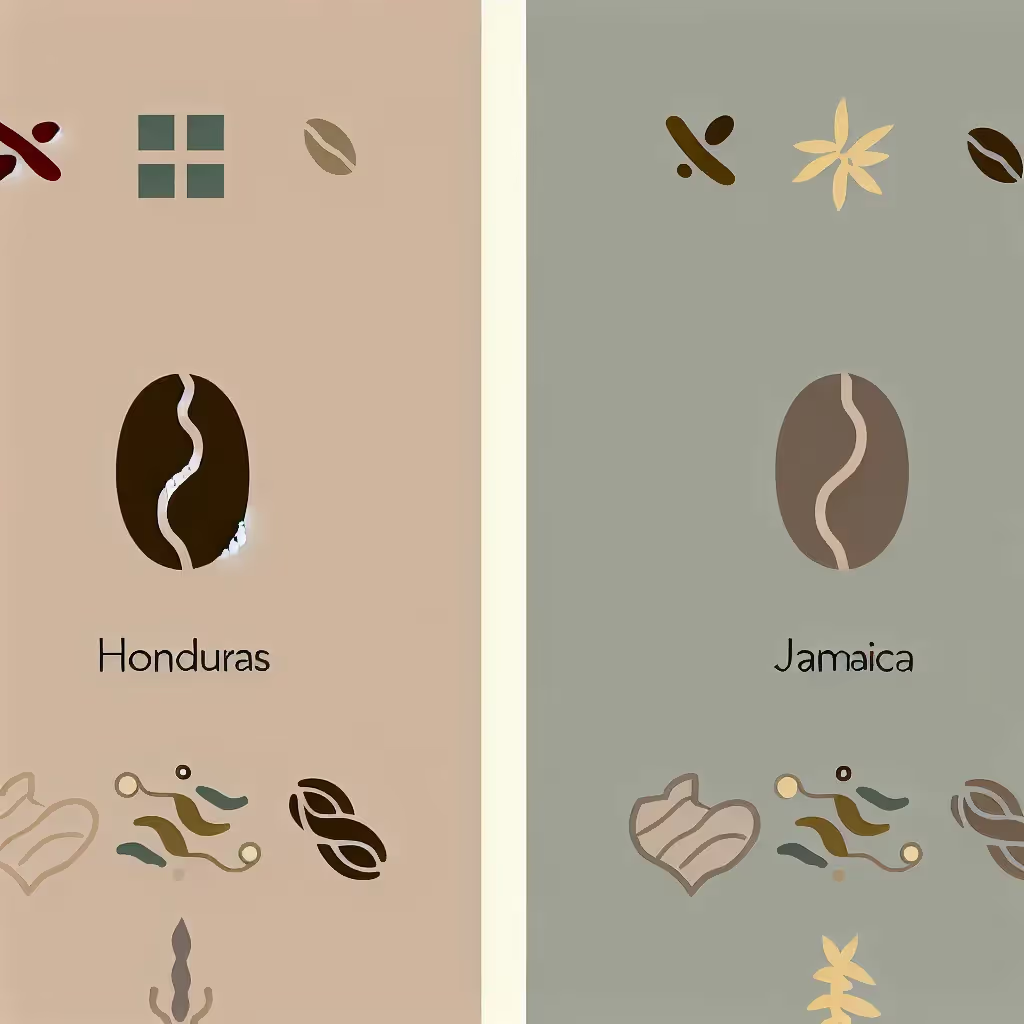Honduran Vs. Jamaican Coffee
This comparison explores the distinctive qualities of Honduran and Jamaican coffee, examining their flavor profiles, growing conditions, and brewing methods to help coffee enthusiasts make informed choices.

Brief Description
Honduran coffee is a hidden gem in the world of specialty coffee, offering a delightful balance of sweetness and acidity. Grown in the lush mountains of regions like Copán, these beans benefit from ideal growing conditions, resulting in a cup that's both complex and approachable. With notes ranging from chocolate to tropical fruits, Honduran coffee is rapidly gaining recognition for its unique flavor profile and consistent quality.
Jamaican Blue Mountain coffee is renowned for its exceptional quality and smooth, mild flavor profile. Grown in the misty peaks of Jamaica's Blue Mountains, these beans benefit from ideal climate conditions and rich volcanic soil. The strictly regulated cultivation and processing methods result in a coffee that's prized for its clean taste, lack of bitterness, and subtle, complex flavors. This rare and sought-after coffee commands premium prices in the global market.
Importance of Comparison
Comparing Honduran and Jamaican coffee is crucial for coffee lovers seeking to expand their palate. These origins represent contrasting flavor profiles and production scales, offering insights into the diversity of coffee experiences. Understanding their differences helps consumers make informed decisions based on taste preferences, brewing methods, and value considerations.
Key Attributes
Origin
Honduran
Jamaican


Consumer Guide
When choosing between Honduran and Jamaican coffee, consider your flavor preferences and brewing methods. Honduran coffee offers a balance of sweetness and acidity, with chocolate, caramel, and citrus notes, making it versatile for pour-over, French press, and espresso. Jamaican Blue Mountain, known for its smooth, mild flavor with nutty and floral notes, excels in pour-over, French press, and cold brew. Consider altitude and processing methods: Honduran coffee grows at 1000-1700m, while Jamaican at 900-1700m. Both use washed and natural processing, with Honduras also employing honey processing. Budget is also a factor, as Jamaican Blue Mountain commands premium prices due to its rarity and reputation.
Expert Opinions
Coffee expert Maria Rodriguez notes, 'Honduran coffee is an underrated gem, offering excellent value with its complex flavor profile. It's perfect for those who enjoy a well-balanced cup.' On Jamaican Blue Mountain, master roaster John Smith states, 'Its smooth, clean taste and lack of bitterness make it a luxury experience. However, its subtle flavors may not satisfy those seeking bold, intense coffees.' Both experts agree that the choice ultimately depends on personal taste preferences and budget considerations.
FAQs
Honduran coffee typically offers a balance of sweetness and acidity, with notes of chocolate, caramel, and citrus. Jamaican Blue Mountain coffee is known for its mild, smooth flavor profile with nutty and floral notes, and a notable lack of bitterness.
Both Honduran and Jamaican coffees are versatile and can be brewed using various methods. Honduran coffee excels in pour-over, French press, and espresso preparations. Jamaican Blue Mountain is particularly well-suited for pour-over, French press, and cold brew methods, which highlight its smooth, subtle flavors.
Jamaican Blue Mountain coffee commands higher prices due to its limited production (only 700 metric tons annually), strict quality controls, and global reputation for excellence. In contrast, Honduras produces around 475,000 metric tons annually, making it more readily available and affordable.
Both coffees benefit from high-altitude cultivation (Honduran: 1000-1700m, Jamaican: 900-1700m), which contributes to their complex flavors. Jamaican Blue Mountain coffee grows in rich volcanic soil and misty conditions, leading to its smooth, mild taste. Honduran coffee's varied microclimates contribute to its diverse flavor profile.
Both Honduran and Jamaican coffees utilize washed and natural processing methods. Additionally, Honduran coffee producers also employ the honey processing method, which can impart unique flavors. The choice of processing method significantly influences the final taste profile of the coffee.
Honduran coffee is often recommended for those new to specialty coffee due to its approachable flavor profile and excellent value. Its balance of sweetness and acidity, along with familiar notes like chocolate and caramel, make it an accessible entry point. Jamaican Blue Mountain, while excellent, may be better appreciated by those with more developed palates due to its subtle flavors and higher price point.
Conclusion
In comparing Honduran and Jamaican coffee, we find two distinct yet equally intriguing origins. Honduran coffee offers a complex, balanced flavor profile with excellent value, making it ideal for daily enjoyment and experimentation with various brewing methods. Jamaican Blue Mountain, with its smooth, mild taste and prestigious reputation, provides a luxury coffee experience. Your choice between these origins should consider your flavor preferences, brewing habits, and budget. For those seeking a versatile, flavorful coffee at a reasonable price, Honduran beans are an excellent choice. If you're looking for a smooth, premium coffee experience and don't mind the higher cost, Jamaican Blue Mountain won't disappoint. Ultimately, both origins offer unique qualities that contribute to the rich tapestry of the coffee world.






